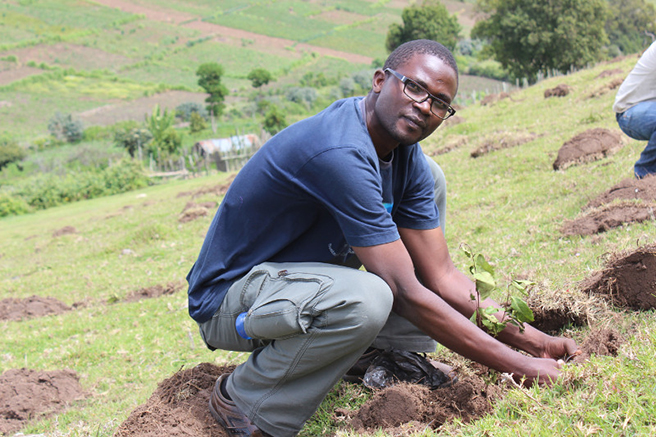Catching Up With Our First Class of Conservation Management Trainees

After more than a year of training and field experience, the first round of AWF Conservation Management Trainees has already amassed a wealth of experience.
George Okwaro
Trainee George Okwaro most recently supported the Mau reforestation project in Kenya’s Rift Valley under the direction of AWF’s technical directors of climate change and science. “I now perceive conservation with a holistic, viable, systems approach and better understand the complexity and the dynamics within and among the different groups of biomes in the landscape,” he says.
In August, Okwaro transitioned from CMTP trainee to full-time AWF employee. In his new capacity as program officer, Mau Forest, he is responsible for the implementation of the forest conservation program in this ecosystem and continues to engage in other forestry and climate change work within the organization.
His promotion provides a perfect example of how AWF envisions CMTP working, where AWF develops high-potential future conservation leaders and looks for opportunities for them to contribute to both our organization and to conservation over the long term.
Theo Way Nana
During his first nine months of fieldwork, The Way Nana, an environmental lawyer from the Democratic Republic of Congo and former Congo landscape community officer for AWF, was based in the Samburu landscape.
Here, he developed land-use plans for Kirimon Group Ranch, which allowed him to use his environmental law expertise to support implementation of participatory forest management plans. He facilitated several meetings with community representatives to explain the importance of land-use planning, obtain their views about the process, and develop an overarching action plan.
From Nana’s current base in Lake Mburo, Uganda, he will spend a second nine-month placement supporting the implementation of the USAID/Uganda Tourism for Biodiversity program.
“In Samburu, I was working mainly in existing conservancies. In Uganda, I am working for the establishment of new conservancies,” Nana reports.
“Both experiences are demonstrating to me how committed AWF really is to building the capacity of Africans in conservation by empowering community and local organizations to take over the responsibility and leadership of conservation in their land areas,” says Nana.